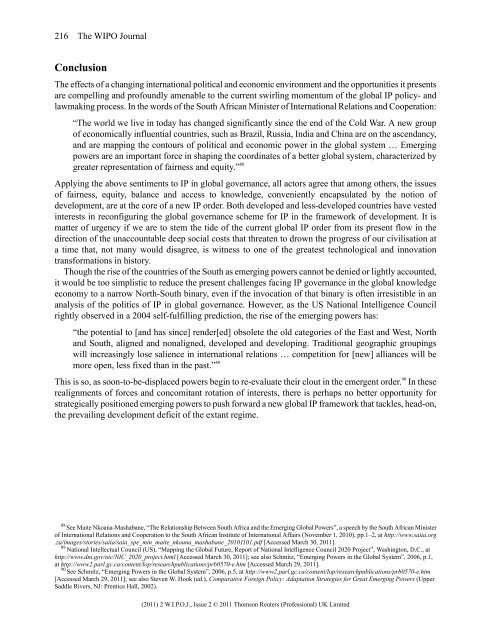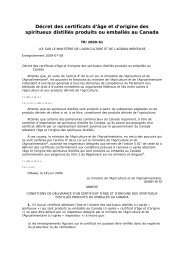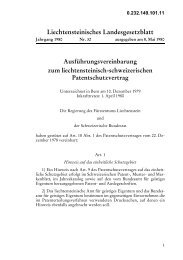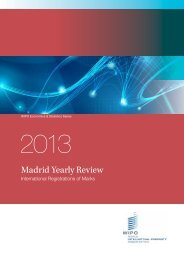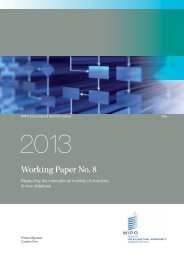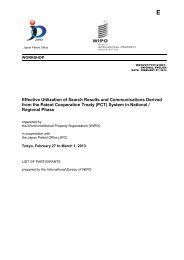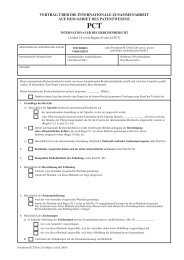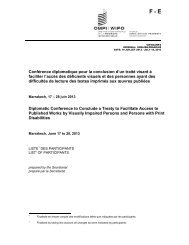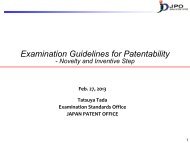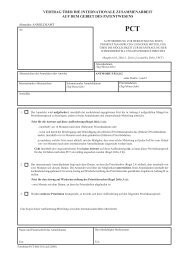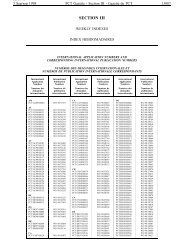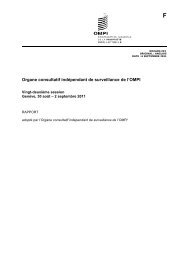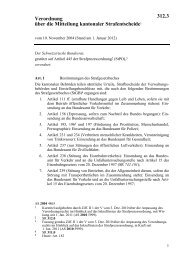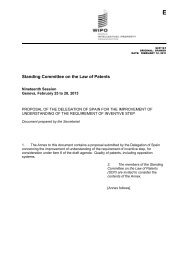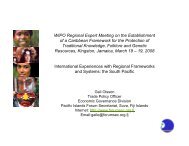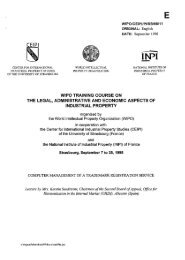WIPO Journal - World Intellectual Property Organization
WIPO Journal - World Intellectual Property Organization
WIPO Journal - World Intellectual Property Organization
You also want an ePaper? Increase the reach of your titles
YUMPU automatically turns print PDFs into web optimized ePapers that Google loves.
216 The <strong>WIPO</strong> <strong>Journal</strong><br />
Conclusion<br />
The effects of a changing international political and economic environment and the opportunities it presents<br />
are compelling and profoundly amenable to the current swirling momentum of the global IP policy- and<br />
lawmaking process. In the words of the South African Minister of International Relations and Cooperation:<br />
“The world we live in today has changed significantly since the end of the Cold War. A new group<br />
of economically influential countries, such as Brazil, Russia, India and China are on the ascendancy,<br />
and are mapping the contours of political and economic power in the global system … Emerging<br />
powers are an important force in shaping the coordinates of a better global system, characterized by<br />
greater representation of fairness and equity.” 88<br />
Applying the above sentiments to IP in global governance, all actors agree that among others, the issues<br />
of fairness, equity, balance and access to knowledge, conveniently encapsulated by the notion of<br />
development, are at the core of a new IP order. Both developed and less-developed countries have vested<br />
interests in reconfiguring the global governance scheme for IP in the framework of development. It is<br />
matter of urgency if we are to stem the tide of the current global IP order from its present flow in the<br />
direction of the unaccountable deep social costs that threaten to drown the progress of our civilisation at<br />
a time that, not many would disagree, is witness to one of the greatest technological and innovation<br />
transformations in history.<br />
Though the rise of the countries of the South as emerging powers cannot be denied or lightly accounted,<br />
it would be too simplistic to reduce the present challenges facing IP governance in the global knowledge<br />
economy to a narrow North-South binary, even if the invocation of that binary is often irresistible in an<br />
analysis of the politics of IP in global governance. However, as the US National Intelligence Council<br />
rightly observed in a 2004 self-fulfilling prediction, the rise of the emerging powers has:<br />
“the potential to [and has since] render[ed] obsolete the old categories of the East and West, North<br />
and South, aligned and nonaligned, developed and developing. Traditional geographic groupings<br />
will increasingly lose salience in international relations … competition for [new] alliances will be<br />
more open, less fixed than in the past.” 89<br />
This is so, as soon-to-be-displaced powers begin to re-evaluate their clout in the emergent order. 90 In these<br />
realignments of forces and concomitant rotation of interests, there is perhaps no better opportunity for<br />
strategically positioned emerging powers to push forward a new global IP framework that tackles, head-on,<br />
the prevailing development deficit of the extant regime.<br />
88 See Maite Nkoana-Mashabane, “The Relationship Between South Africa and the Emerging Global Powers”, a speech by the South African Minister<br />
of International Relations and Cooperation to the South African Institute of International Affairs (November 1, 2010), pp.1–2, at http://www.saiia.org<br />
.za/images/stories/saiia/saia_spe_min_maite_nkoana_mashabane_20101101.pdf [Accessed March 30, 2011].<br />
89 National <strong>Intellectual</strong> Council (US), “Mapping the Global Future, Report of National Intelligence Council 2020 Project”, Washington, D.C., at<br />
http://www.dni.gov/nic/NIC_2020_project.html [Accessed March 30, 2011]; see also Schmitz, “Emerging Powers in the Global System”, 2006, p.1,<br />
at http://www2.parl.gc.ca/content/lop/researchpublications/prb0570-e.htm [Accessed March 29, 2011].<br />
90 See Schmitz, “Emerging Powers in the Global System”, 2006, p.5, at http://www2.parl.gc.ca/content/lop/researchpublications/prb0570-e.htm<br />
[Accessed March 29, 2011]; see also Steven W. Hook (ed.), Comparative Foreign Policy: Adaptation Strategies for Great Emerging Powers (Upper<br />
Saddle Rivers, NJ: Prentice Hall, 2002).<br />
(2011) 2 W.I.P.O.J., Issue 2 © 2011 Thomson Reuters (Professional) UK Limited


